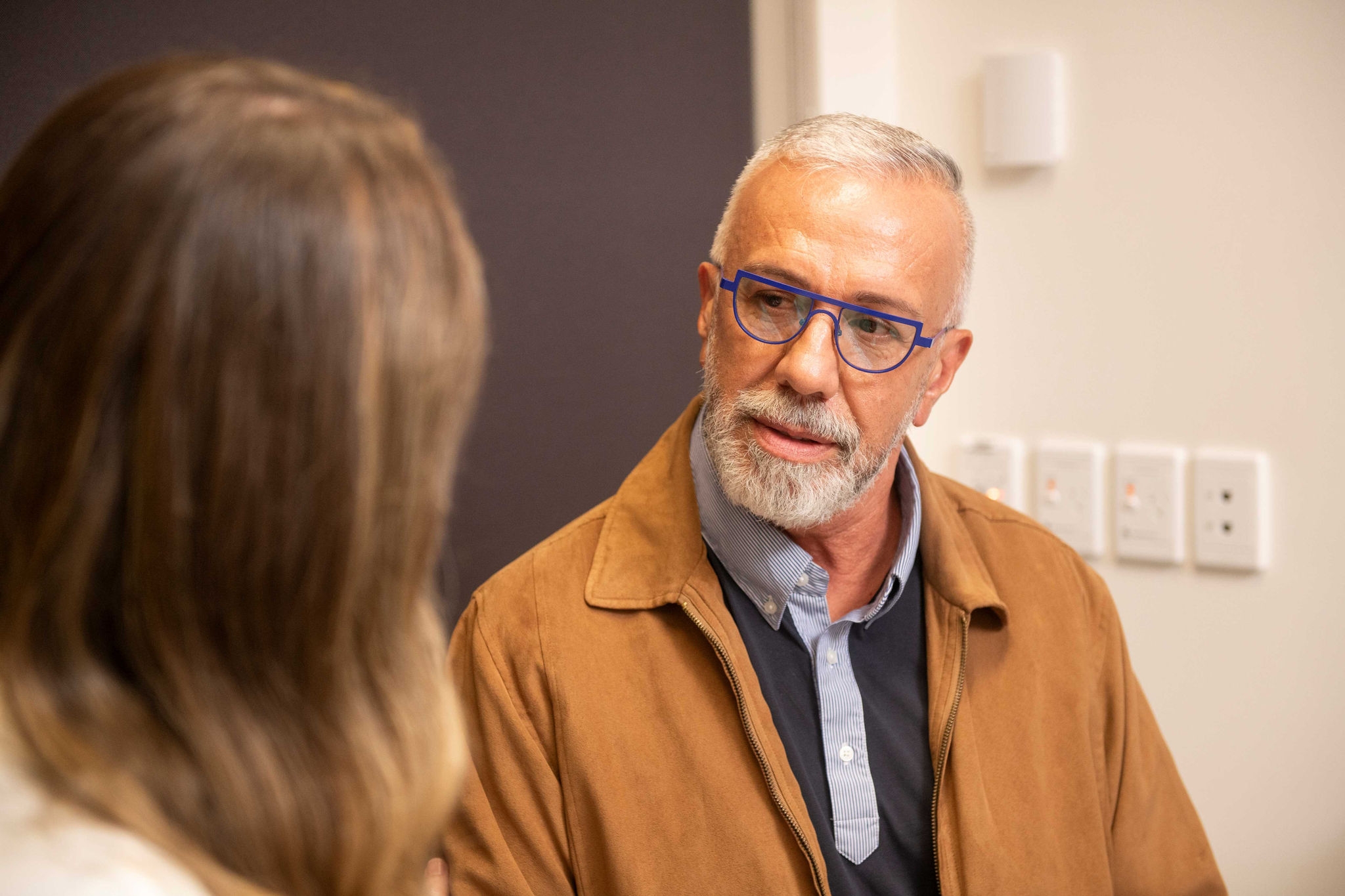- Home
- Conditions we treat
- Gastrointestinal cancer
- Liver Cancer
Introduction

Liver cancer
Learn more about liver cancer, including types, symptoms, risk factors, steps to diagnosis, and treatment options.
What is liver cancer?
What is liver cancer?
Liver cancer can be grouped into either primary or secondary liver cancer.
Primary liver cancer is a malignant tumour that starts growing in the liver.
Secondary liver cancer occurs when the cancer itself starts in another part of the body and moves (metastasises) to the liver. Cancer cells from a primary cancer can spread from another part of the body through the bloodstream or lymph vessels to the liver. In Australia, secondary liver cancer is more common than primary liver cancer.1
- Hepatocellular carcinoma (HCC), which is the most common type of primary liver cancer. It starts in the main cell type in the liver, which is called the hepatocytes
- Cholangiocarcinoma, also known as bile duct cancer, starts in the cells lining the bile ducts (which connect the liver to the bowel and gall bladder)
- Angiosarcoma, which starts in the blood vessels, is considered to be a rare type of liver cancer.
Often in its early stages, there are no symptoms of liver cancer. Symptoms may only start developing once the cancer has grown or spread. Symptoms may include:1
- Weakness and tiredness
- Pain in the abdomen
- Pain below the right shoulder blade
- Swelling of the abdomen due to a build-up of fluid
- Pain in the right shoulder
- Appetite loss and feeling nauseous
- Unexplained weight loss
- Yellowing of the skin and eyes (jaundice)
- Pale and frothy bowel motions
- Itchy skin.
If you have one or more of these symptoms it doesn't necessarily mean that you have liver cancer. It's suggested to make an appointment with your GP or specialist if you have any questions or concerns.
Often, primary liver cancer will develop in people who may already have a type of liver disease – commonly cirrhosis. Cirrhosis may be caused by a long-term infection with the hepatitis B or C virus, too much alcohol consumption, metabolic-associated fatty liver disease - resulting from obesity and/or type 2 diabetes or a condition called haemochromatosis (where there is too much iron in your blood).1
There are also other risk factors that people can have that may be associated with liver cancer, including:1
- Smoking tobacco
- Family history of liver cancer
- Aboriginal or Torres Strait Islander peoples.
- Migrants from areas where hepatitis B infection is greater (such as Asia, the Pacific Islands and Africa).
Make an enquiry
Contact us today to find out how GenesisCare can help you.
Diagnosis
Diagnosing liver cancer
A range of tests may be performed to analyse symptoms and to diagnose liver cancer (and to determine the type and stage of liver cancer). Following a physical examination, further tests may include:1
- Blood tests - these tests examine liver function, blood clotting, whether you have Hepatitis B or C, and test for tumour markers
- Ultrasound - a commonly used method to look for primary liver cancer; it can show the size and location of abnormal tissue in your liver
- Computed tomography scan (CT) - with the help of x-rays to take detailed images of your liver and also other organs (if necessary)
- Magnetic resonance imaging (MRI) scan - uses a strong magnet and radio waves to take detailed cross-sectional pictures of the body and can show the size of a tumour and whether it is affecting the main blood vessels around the liver
- Biopsy - a sample of tissue is taken from the liver for examination under a microscope to see if it looks like cancer.
If you have secondary cancer in the liver, you may have further tests to find out where the primary cancer started, if this is not already known.

Find a doctor
Search for liver cancer specialists in your state.
Treatment options
Treatment options for liver cancer
The type of surgery recommended to treat liver cancer depends upon a range of factors including the tumour size, number of tumours, location in the liver, and whether you have cirrhosis.
Types of surgery utilised may include removing part of the liver or a liver transplant.
This type of treatment is usually recommended for small primary liver cancers and if surgery is not an option.
There are different types of tumour ablation available including thermal ablation, alcohol injection, and cryotherapy.
The type offered depends on the size, shape, and location of the tumour.
This type of treatment is a form of chemotherapy.
If it's not possible to have surgery or if you are waiting for a liver transplant, then TACE may be recommended as a treatment option.
This is a way of delivering high doses of chemotherapy directly to the tumour while also blocking its blood supply.
Radiation therapy uses high-energy x-rays or other particles to treat cancer and can be used at all stages.
A range of treatments that aim to work against the cancer cells by either stopping their growth or function, or by helping the body's immune system destroy them.
Biological therapies are usually offered for both primary and secondary cancers in the liver, and may be used in conjunction with, or after other treatments for cancer.
Targeted therapy refers to treatment with drugs that are designed to specifically attack cancer cells without harming normal cells.
These types of drugs affect the way that cancer cells grow, divide, repair themselves or interact with other cells
This is another type of drug treatment that is intended to help your immune system fight cancer.
There are different types of immunotherapy for cancer that work in different ways.

All cancer treatments may have side effects. The type and severity of side effects will vary between individuals. You can ask your doctor for detailed information about the side effects which you may experience with any treatment recommended for you.
Recommendations to help you stay well during treatment1
- Get as much rest as possible
- Healthy eating is important, but you should also try to think about eating foods that interest you rather than what you think you should eat
- Appetite changes are common, and you may experience taste changes or nausea
- It may help to eat smaller meals rather than three large ones throughout the day
- Drink lots of fluids
- To prevent dehydration, aim to drink water between meals and avoid filling up on fluids during mealtimes to ensure you have enough room for nutrient-rich foods
- Reach out to support groups and others who have had cancer treatment
- Record your side effects in a diary or journal
- Speak to your doctor about incorporating some gentle exercise into your weekly routine
- It is important to acknowledge when you are fatigued and rest when you need to
- Ask for and accept help from family, friends and neighbours
- Be open with employers about your treatment and discuss flexible working options if you need them
Find a centre
Search for consulting and treatment locations near you.
Support services
Support services
- Cancer Council. Understanding liver cancer. Available at: https://www.cancer.org.au/assets/pdf/understanding-liver-cancer-booklet (accessed February 2024).

You are leaving our website
You are now leaving our website. GenesisCare do not control this content and therefore are not responsible for its accuracy or reliability.
Disclaimer:
This website is provided for information purposes only. Nothing on this website is intended to be used as medical advice, or to diagnose, treat, cure or prevent any disease. It should not be used as a substitute for your own health professional's advice. Any medical procedure or treatment carries risks. Before proceeding with treatment, you should discuss the risks and benefits of the treatment with an appropriately qualified health practitioner. Individual treatment outcomes and experiences will vary.


